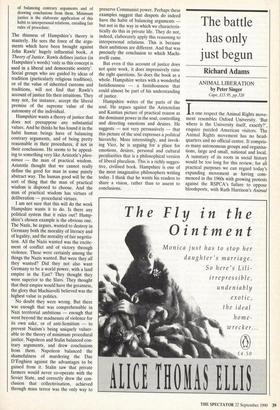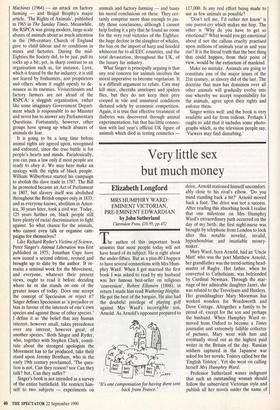The battle has only just begun
Richard Adams
ANIMAL LIBERATION by Peter Singer Cape, £15.95, pp.320 In one respect the Animal Rights move- ment resembles Oxford University. 'But where is the University itself, exactly?'. enquire puzzled American visitors. The Animal Rights movement has no head- quarters and no official centre. It compris- es many autonomous groups and organisa- tions, large ard small, national and local. A summary of its roots in social history would be too long for this review; for all practical purposes we can regard today's expanding movement as having com- menced in the 1960s with growing protests against the RSPCA's failure to oppose bloodsports, with Ruth Harrison's Animal Machines (1964) — an attack on factory farming — and Brigid Brophy's major article, 'The Rights of Animals', published in 1965 in The Sunday Times. Meanwhile, the RSPCA was giving modern, large-scale abuses of animals about as much attention as the 19th-century Church of England gave to child labour and to conditions in mines and factories. During the mid- Eighties the Society did, to be just, pull its socks up a bit; yet, in sharp contrast to an organisation such as, for instance, Lynx, which is feared by the fur industry, it is still not feared by foxhunters, zoo proprietors and others whom it ought openly to de- nounce as its enemies. Vivisectionists and factory farmers are not afraid of the RSPCA: a sluggish organisation, rather like some imaginary Government Depart- ment which is responsible to no Minister and never has to answer any Parliamentary Questions. Fortunately, however, other groups have sprung up which abusers of animals do fear.
It is going to be a long time before animal rights are agreed upon, recognised and enforced, since the true battle is for people's hearts and minds. Paradoxically, you can pass a law only if most people are ready to obey it. We may here make an analogy with the rights of black people. William Wilberforce started his campaign to abolish the slave trade in 1787. The Bill he promoted became an Act of Parliament in 1807, but slavery itself was abolished throughout the British empire only in 1833: and as everyone knows, abolition in Amer- ica, 30 years later, took a civil war. Today, 125 years further on, black people still have plenty of racial discrimination to fight against. So what chance for the animals, who cannot even talk or organise cam- paigns for themselves?
Like Richard Ryder's Victims of Science, Peter Singer's Animal Liberation was first published in 1975; Jonathan Cape have now issued a second edition, revised and brought up to date by the author. It re- mains a seminal work for the Movement, and everyone, whatever their present views, ought to read it before deciding where he or she stands on one of the greater issues of today. Does one accept the concept of Speciesism or reject it? Singer defines Speciesism as 'a prejudice or bias in favour of the interests of one's own species and against those of other species.' I define it as 'the belief that any human interest, however small, takes precedence over any interest, however great, of another species.' Both Singer and Ryder, who, together with Stephen Clark, consti- tute about the strongest apologists the Movement has so far produced, take their stand upon Jeremy Bentham, who in the early 19th century proclaimed, 'The ques- tion is not, Can they reason? nor Can they talk? but, Can they suffer?'
Singer's book is not intended as a survey of the entire battlefield. He restricts him- self to two subjects — experiments on animals and factory farming — and bases his moral conclusions on these. They cer- tainly comprise more than enough to jus- tify those conclusions, although I cannot help feeling it a pity that he found no room for the very real victories of the Eighties: the huge decline in the slaughter of whales, the ban on the import of harp and hooded whitecoat fur to all EEC countries, and the total devastation, throughout the UK, of the luxury fur industry.
What Singer is principally arguing is that any real concern for animals involves the moral imperative to become vegetarian. It is a difficult argument to refute. Cats may kill mice, cheetahs antelopes and spiders flies, but they do not keep their prey cooped in vile and unnatural conditions dictated solely by economic competition. Again, it is true that effective treatment of diabetes was discovered through animal experimentation; but that has little connec- tion with last year's official UK figure of animals which died in testing cosmetics — 117,000. Is any real effort being made to use as few animals as possible?
'Don't tell me, I'd rather not know' is one parrot-cry which makes me hop. The other is 'Why do you have to get so emotional?' What would you get emotional about if not the callous cruelty practised upon millions of animals year in and year out? It is the literal truth that the best thing that could happen, from their point of view, would be the extinction of mankind.
Make no mistake. Animals are going to constitute one of the major issues of the 21st century, as slavery did of the last. The doctrine that man has dominion over all other animals will gradually evolve into one whereby we accept responsibility for the animals, agree upon their rights and enforce them.
Singer writes well: and the book is very readable and far from tedious. Perhaps I ought to add that it includes some photo- graphs which, as the television people say, 'Viewers may find disturbing.'



































































 Previous page
Previous page